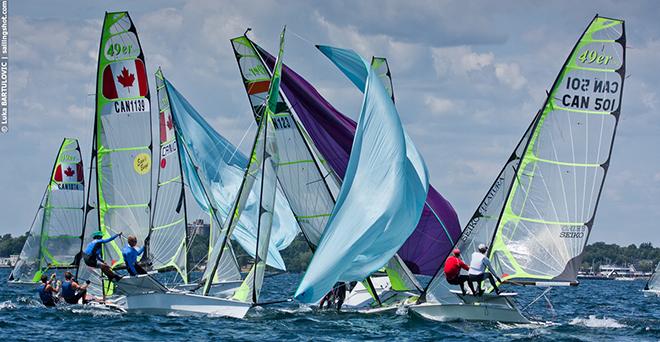An interview with Marianne Davis about the CORK International Regatta
by David Schmidt, Sail-World USA Editor on 7 Aug 2017

2015 CORK International Regatta Sail Canada / Voile Canada
http://www.sailing.ca/
When it comes to One Design proving grounds in North America, the annual CORK (Canadian Olympic-training Regatta, Kingston) regattas have long been held in high regard by sailors and industry professionals alike and are likely North America’s most competitive annual freshwater events for high-level One Design racing. Here, set against a backdrop of deciduous trees, wind turbines, and Lake Ontario’s expansive stretches of freshwater, some of the fastest One Design and prospective Olympic sailors come to test their skills against their peers from both sides of the American-Canadian border and-in some classes-from around the world.
CORK events now include the CORK International Optimist Regatta (August 10-13), the CORK International Board Regatta (August 10-13), the CORK International Regatta (August 13-17), and the CORK Olympic Class Regatta, as well as the CORK Fall Regatta (September 22-24).
As its name implies, the CORK International Optimist Regatta is for the world’s best-loved floating pram, while the CORK International Board Regatta offers racing for BIC and RSX sailors.
The CORK International Regatta delivers racing for International 420s, Club 420s, Laser Radials, and 29ers, while the CORK Olympic Class Regatta will see Lasers, Laser Radials, 49ers and 49erFXs, Finns and I14s competing on its starting lines.
While registration lists include the names of international sailors, these events are easily some of the gemstones in Sail Canada’s yearly championship calendar, making them of extra importance to Canadian One Design sailors and Olympic hopefuls. I recently caught up with Marianne Davis, co-chair of the 2017 event (along with co-chair Tim Irwin), via email, to learn more about the CORK International Regatta’s evolution and its current state of affairs.
How are your registration numbers looking for 2017? How does this compare with recent previous editions? Are you seeing growth or a sustainable plateau?
[Our] registration numbers are looking good for the Laser Canadians and Optimist events, and we expect CORK International to be similar to previous years. Participation level seems to be pretty similar to previous years. The Olympic classes will always fluctuate, depending on how our event dates fit with the international event schedule for World Championships and other major events.
Do you guys have anything new or exciting in store for 2017 competitors?
Earlier this season, we hosted the 49er & 49erFX Worlds with boundaries for the medal-races the last day. This presented a challenge for both competitors and for us as event hosts and was a great way to finish off the Championships.
Do you have an idea of what percentage of entrants in the CORK International Regatta go on to eventually participate in the CORK Olympic Classes Regatta, as they progress to Olympic-level classes? Or, is it best not to think of the CORK International Regatta as a stepping stone event to Olympic-class racing? Can you please explain?
CORK International is very much a stepping-stone for young competitors, as well as coaches. We see many move on to Olympic classes and they come back year after year to compete at CORK. We also put a strong emphasis on training and mentoring of officials and volunteers.
What was the reason for moving the Laser class to the CORK Olympic Classes Regatta while keeping the Laser Radial in the CORK International Regatta?
The Laser Radial is used for both male and female competitors in the Youth Worlds and the fleet is very strong in many areas. Most of the sailors having moved on to the full rig are ready to handle competition against the senior sailors. By focusing on the Radial [Editor’s note: Laser Radial sailors must be “U19”, or under the age of 19 on December 31, 2017] in CORK International, and moving the full rigs to OCR [Editor’s note: Olympic Class Regatta], we felt we can give both a better racing experience.
How many starting lines do you anticipate running? Also, will the event use on-the-water judges, or will protests be given an audience in “the room”?
We will run three racecourses, and there will be on-the-water judges for all events.
What kinds of steps has the CORK International Regatta taken to become a more sustainable/responsible environmental steward? Or, if you guys have not yet had a chance to take these steps, have you considered partnering with an organization such as Sailors for the Sea?
We have joined Sailors for the Sea this year and will be promoting this during our events. We have arranged with Utilities Kingston to have their portable refilling-station for water bottles, and all volunteers will be given reusable water bottles instead of single-use plastic bottles. Recycling stations will be set up in cooperation with the City of Kingston, and we are reducing printing by moving more information to the website.
If you want to link to this article then please use this URL: www.sail-world.com/156101